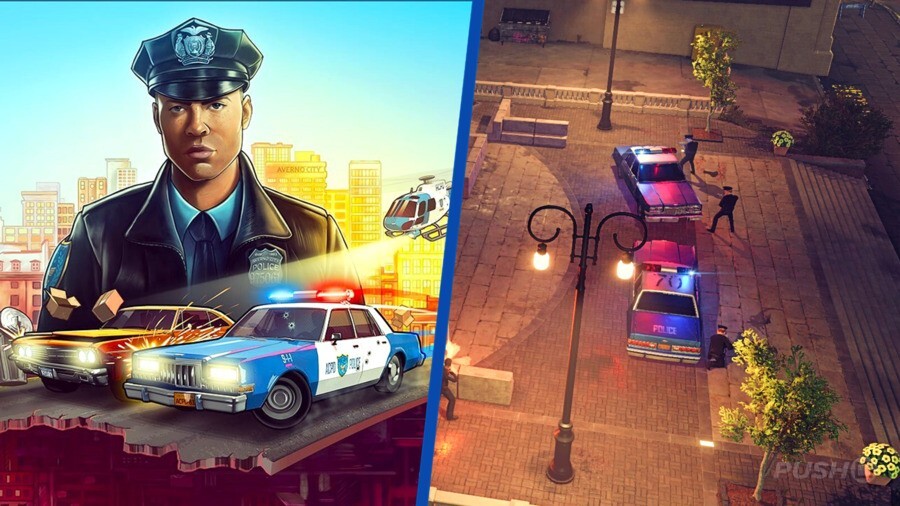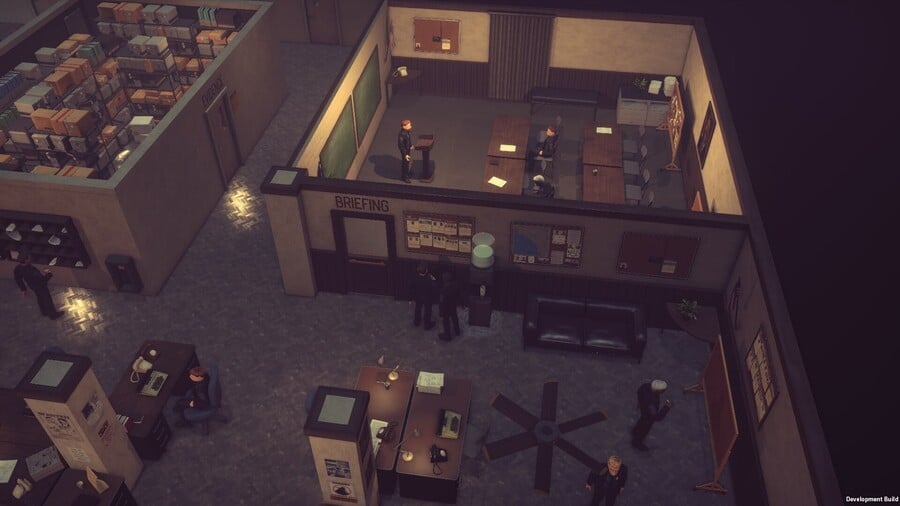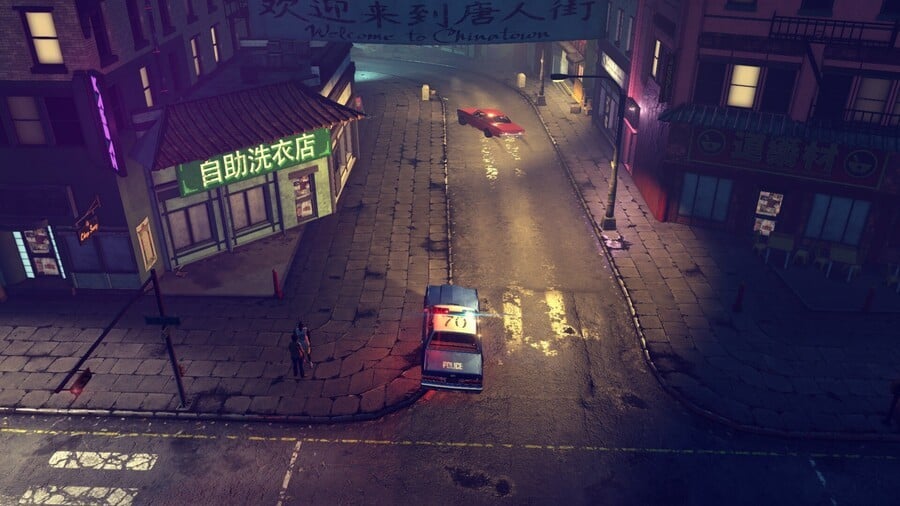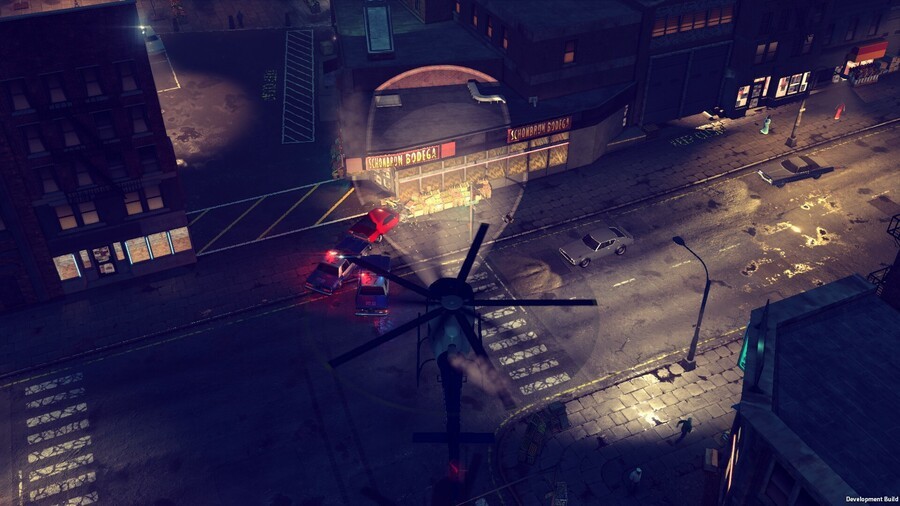
We've been keeping an eye on The Precinct for a while now. It's an indie game where you play as a cop, fighting crime on the streets of a sandbox city. It's always sounded like a really cool concept to us, and so we caught up with Lewis Boadle — the title's art director and co-founder of developer Fallen Tree Games. We asked Lewis about the overall scope of The Precinct, its inspirations, its gameplay, and much more.
Push Square: To start with, can you give us an overview of what The Precinct is? What was your goal with this project?
 Watch on YouTube
Watch on YouTubeSubscribe to Push Square on YouTube166k
Lewis Boadle, Art Director and co-founder of Fallen Tree Games: The game is set in Averno City in 1983. You play as a rookie beat cop fresh out of the Academy, exploring and dealing with the ever-shifting criminal underbelly of Averno City. The plot of the game also requires players to solve the mystery of their father’s murder in the line of duty. There is a lot for players to uncover in the game.
The goal of this project is to deliver a high-quality police game that provides both action and simulation elements, so players really feel like a cop.
What are the main inspirations behind The Precinct? Are there any particular games, movies, or shows that pushed your ideas forward?
So many movies and TV inspired the game that it’s hard to know where to begin, but if we had to single out a few, we would probably say “Driver” (1978), “Fort Apache, The Bronx" (1981), "The French Connection" (1971), and “Taxi Driver” (1976). As well as those incredible movies, TV shows like “Hill Street Blues” (1981-1987) and “Cagney and Lacey” (1981-1988) are burned into our childhoods!
In terms of games, it’s pretty obvious we are huge fans of the original GTA games as well. We also have a soft spot for a GTA police mod called LSPDFR. The Precinct was our attempt to bring that concept to life in 80s style — with a top down camera!

Can you tell us about the game's development? How big's the team at Fallen Tree Games?
Most of the development has been just four of us. Two artists and two programmers to do everything. As the scope has expanded, and the quality bar has risen, we’ve been able to expand the team to include a dedicated designer, and bring on some additional programming help. We also use some brilliant external talent, such as voice actors, 2D artists, and musicians.
Your previous game, American Fugitive, obviously has a similar look and structure. How has your experience with that project helped shape The Precinct?
American Fugitive was an incredibly ambitious project for such a small team (as is this one), and we learned a lot! Players will have more freedom in The Precinct compared to American Fugitive. They can also continue intercepting and responding to crimes after the main story is over. That is why our crime-generation system is so important.
The Precinct also has voice acting, something which was not present in American Fugitive. We believe that voice acting really brings the story alive and it’s incredible to work with the talent that’s there in the industry right now.
So, procedural generation's a big part of The Precinct. What can you tell us about the game's procedural crime system?
We refer to it as the Crime Generation System. As players go about their patrol shifts — whether on foot, in a vehicle, etc. — the system generates incidents throughout the world. These incidents fall into four main categories:
- Dispatch Callouts: These are crimes reported to Dispatch and communicated to the player via radio. Players can choose to accept or ignore these callouts. Accepting them assigns the player to respond urgently, often due to potential threats to life or property. Examples: Store robbery, gang shootout, vehicle theft.
- Proximity Crimes: Serious offences that occur near the player's location. Players can decide to Accept and turn them into active callouts, or ignore them. These are usually visible and encourage players to observe their surroundings closely. Examples: Drunk driver, mugging in an alleyway, drug deal.
- Infractions: Minor offences that happen very close to the player. Engaging with these turns them into active callouts, depending on how strictly the player chooses to enforce the law. Examples: Parking violations, graffiti artist tagging a wall, littering.
- Incidents: These are general police duties that don't necessarily involve a crime but can lead to the discovery of criminal activity. Examples: Road traffic accident.
Some shift types will give more XP to successfully dealing with certain categories of crime. For example, if you choose ‘Drug Crackdown’ patrol, you’ll get more XP for arresting drug dealers.
What's the player striving for in The Precinct? Is there a main story, or is it purely a sandbox title?
Sandbox is a big part of the game but the plot of the game also requires players to solve the mystery of their father’s murder in the line of duty following a fully voiced questline in the open world. There is a lot for players to uncover in the game.

How big is the game's map?
The map has different districts with its own identity and problems. Players can anticipate spending approximately 6-8 hours to successfully complete the main story line. Additionally, players have the option to confront other gangs and gather a variety of in-game items. As previously highlighted, our focus on spontaneous crime generation ensures that the game delivers nearly limitless gameplay possibilities.
Are there penalties for not doing things by the book? How much freedom can players expect?
Since you’re a rookie cop, you are handed a handbook in the beginning of the game. There you’ll be taught how to respond to all kinds of crime and other illegal activities. You have relative freedom on how you approach any situation but within the boundaries of the law. There are both penalties for not doing your job properly, depending on the severity of your actions, and bonuses for following procedure.

Are there difficulty settings in The Precinct? How unforgiving can the game be overall?
The game is balanced and it’s an experience for everyone.
And finally, is there anything you'd like to say to our readers?
Thanks for all the support and encouragement the PS community has given us!
Huge thanks to Lewis Boadle for taking the time to answer our questions. Special thanks to Allwyn D'Souza and the team at Kwalee for making this interview possible.
The Precinct is set to release for PS5 this autumn. Are you looking forward to upholding the law? Start by patrolling the comments section below.





Comments 31
Really looking forward to this one. The 6-8 hours for the main storyline seemed alarming at first, but I can see myself spending way more time here
This looks superb 👌
Removed - inappropriate
@glassmusic because police are the people who run towards danger while you run away from it
Removed - flaming/arguing
@glassmusic because that's not representative of the vast majority of policemen and women.
@glassmusic @Golem25 @riceNpea
Cops are class traitors who are paid for with our tax dollars to protect the assets of the ultra-wealthy and to fill for-profit jails. Not all cops are explicit in this but they all participate in it.
Even Jake Peralta
The game looks cool though. Are there water canons, rubber bullets and riot shields or just armoured vehicles and assault helicopters?
@glassmusic
Do yourself a favour and stop reading out of context outrage twitter whiners and go watch some DonutOperator then.
The vast majority of these claims you describe will vanish into thin air when seeing the full videos from all angles.
I was just like you, always hating on US police, but after seeing the real stuff they deal with, massive respect to them. BUT! Lots of power hungry bad apples there as well, undeniably
Subtle joke in the subhead. I like it.
Congrats on the interview guys! Must’ve been fun to get to talk to them! This was a good read.
@Mikey856 Or, there are the ones who wait outside in fear while children are mercilessly slaughtered inside. I can't wait for the mission in this game when you plant evidence on someone!
@Specky sorry to ask something unrelated, but is your avatar Appa from, err, Avatar the last airbender? If not, sorry for the disturbance.
@DogPark
I'm looking forward to the mission where you get to beat up university students who have the audacity to disagree with the ruling corporate elite.
@MikeOrator ever play Disco Elysium?
Nice looking game, amazing they can create this with such a small team, really impressive.
@LieutenantFatman it reminds me of those gritty 70/80s American cop shows… Columbo or Police Academy 🫣 MAHONEEEEEEY
I recently purchased American Fugitive and it’s really good (so far, only played a few hours) but this looks excellent . Will definitely be checking this out.
@Mikey856
Haha, classic. Just one more thing..
@glassmusic If you believe every single cops are bad then there's no games like Resident Evil, Parasite Eve, Max Payne, L.A Noire, Sleeping Dogs, The Getaway, S.W.A.T, Driver, etc etc where you're playing as a cop.
It's like saying you hate apples and called it the worst fruit in the world just because you only see or eat the rotten one.
I really want this to be great, but I'm starting to worry that it is too generic...like American Fugitive. I'd be interested in something dystopian, or even on a different planet. Following procedure irl seems incredibly dull.
Look up an essay called "Confessions of a Former B*****d Cop" and see if that changes your attitude about cops at all. It changed mine.
I used to enjoy games where I played a cop. After George Floyd, I just can't play them anymore.
@glassmusic
My man! Don't mind the apologists! Cops are crooked by default, even if there are 1312 of them, and all participants to the upholding of capitalist class structures. The game, good looking nonetheless, is bad copaganda (search this) just as Paw Patrol is.
@MikeOrator maybe even minigames where citizens in cuffs "fall down stairsets" because they're drunk? Or cell ganking? Honest question!
Looks interesting, but I don't play games with the camera view used in this game. Watching gameplay has me wishing for a True Crime Streets of NY remaster or remake.
@glassmusic You're absolutely right, this is the behaviour of cops, particularly American cops who seem to think they are literally a law unto themselves
The ghastly stores I read on a daily basis of shocking, depraved acts are abhorrent and the cover up or dismissal with huge financial benefits just compounds my disgust
However they are not all bad.............hopefully
This actually looks great! Setting and era look like they’re really captured, and that list of movie inspirations is perfect!
For those complaining about the who you play as… I get I guess, but from the looks of it this just looks like a great procedural crime game with a Michael Mann type vibe, and I’m totally down for that! Sounds like you can play it semi-dirty if you want as well, which is another nice spin.
Hoping for DLC where you spend Friday night moping up all the drunken teenagers in Chatham.
Definitely interested in this one
Thanks for the interview, games sounds interesting
@TedSeattle Also if you think about the average game dev time being 3-4 years, the timing of when this game started development makes it even more questionable.
@TedSeattle you might enjoy a podcast called Running from Cops (the TV show, Cops) and a book called Rise of the Warrior Cop.
Excellent, can't wait to get home and relax to Fascist Simulator 2024
Show Comments
Leave A Comment
Hold on there, you need to login to post a comment...